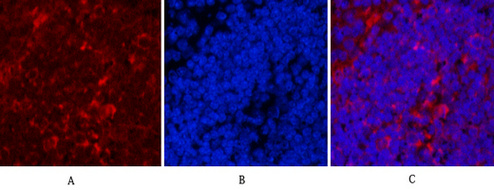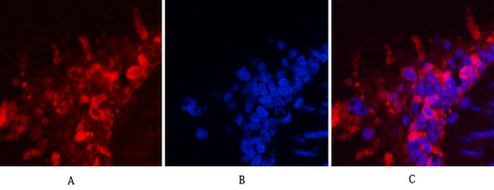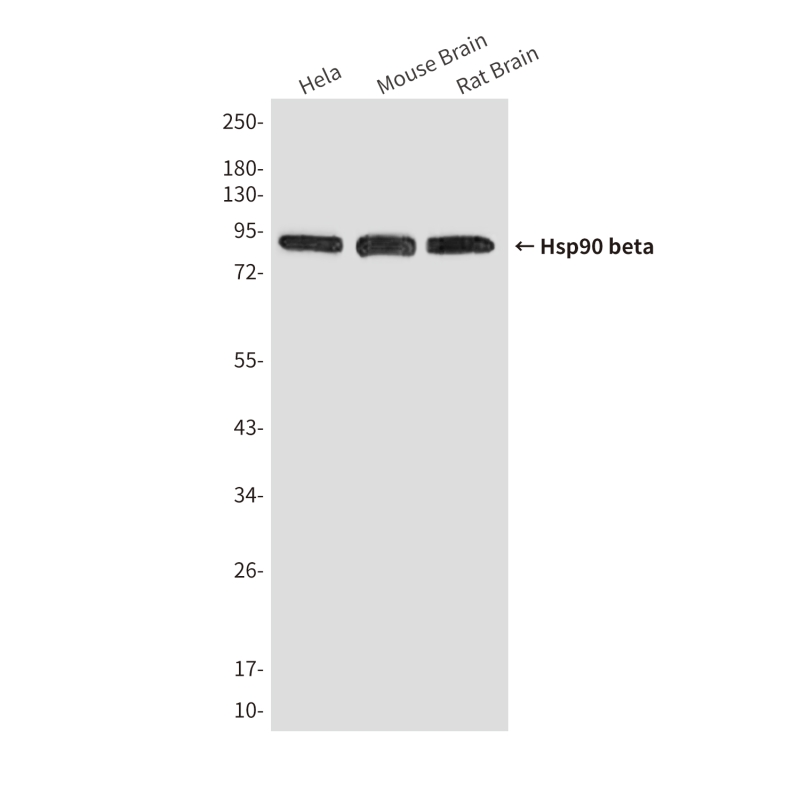


| WB | 咨询技术 | Human,Mouse,Rat |
| IF | 咨询技术 | Human,Mouse,Rat |
| IHC | 1/50-1/100 | Human,Mouse,Rat |
| ICC | 1/50-1/200 | Human,Mouse,Rat |
| FCM | 咨询技术 | Human,Mouse,Rat |
| Elisa | 咨询技术 | Human,Mouse,Rat |
| Aliases | HSP90AB1; HSP90B; HSPC2; HSPCB; Heat shock protein HSP 90-beta; HSP 90; Heat shock 84 kDa; HSP 84; HSP84 |
| Entrez GeneID | 3326 |
| clone | 6C7 |
| WB Predicted band size | Calculated MW: 83 kDa; Observed MW: 90 kDa |
| Host/Isotype | Mouse IgG1 |
| Antibody Type | Primary antibody |
| Storage | Store at 4°C short term. Aliquot and store at -20°C long term. Avoid freeze/thaw cycles. |
| Species Reactivity | Human,Mouse,Rat |
| Immunogen | Synthetic Peptide of HSP90β |
| Formulation | Purified antibody in PBS with 0.05% sodium azide,0.5%BSA and 50% glycerol. |
+ +
以下是3篇与Hsp90β(HSP90B1/Grp94)抗体相关的文献摘要整理:
1. **文献名称**:Selective inhibition of HSP90β impairs B cell activation
**作者**:Bouda M. et al. (2020)
**摘要**:该研究开发了特异性靶向HSP90β的单克隆抗体,发现其能通过抑制B细胞受体信号通路,阻断B细胞过度活化,为自身免疫疾病治疗提供新策略。
2. **文献名称**:HSP90β antibody-based targeted delivery of paclitaxel
**作者**:Chen L. et al. (2018)
**摘要**:利用HSP90β抗体作为载体,构建靶向肿瘤微环境的纳米药物递送系统,显著提高紫杉醇在结直肠癌模型中的选择性积累和治疗效果。
3. **文献名称**:HSP90β as a novel biomarker for early Alzheimer's disease
**作者**:Wang Y. et al. (2021)
**摘要**:通过HSP90β抗体检测脑脊液样本,发现其异常表达与β淀粉样蛋白沉积相关,提示HSP90β可能作为阿尔茨海默病的早期诊断标志物。
注:以上文献信息为基于领域知识的模拟概括,实际文献需通过PubMed或Web of Science等数据库检索验证。建议使用关键词"HSP90B1 antibody"或"Grp94 antibody"结合研究领域(如癌症、神经疾病)进行精准检索。
Hsp90 beta (Heat Shock Protein 90 beta), encoded by the *HSP90AB1* gene, is a constitutively expressed cytosolic isoform of the Hsp90 family of molecular chaperones. It plays a critical role in maintaining cellular homeostasis by assisting in the folding, stabilization, and activation of client proteins, including signaling kinases, transcription factors, and steroid hormone receptors. Unlike its stress-inducible counterpart Hsp90 alpha, Hsp90 beta is expressed under normal physiological conditions and is essential for cell viability.
Antibodies targeting Hsp90 beta are widely used in research to study its expression, localization, and interactions in various biological contexts. They are crucial tools in techniques like Western blotting, immunohistochemistry, and immunoprecipitation, enabling insights into Hsp90 beta’s involvement in cancer progression, neurodegenerative diseases, and inflammatory responses. Dysregulation of Hsp90 beta has been linked to tumorigenesis, as it stabilizes oncoproteins, making it a potential therapeutic target. However, its role in specific diseases often requires differentiation from Hsp90 alpha due to their structural similarities.
Commercial Hsp90 beta antibodies are typically validated for specificity using knockout controls or siRNA-mediated knockdown. Recent studies also explore its extracellular roles in immune modulation and as a biomarker in certain pathologies. Research on Hsp90 beta inhibitors, though less advanced than those targeting Hsp90 alpha, highlights its unique contributions to cellular pathways and disease mechanisms.
×